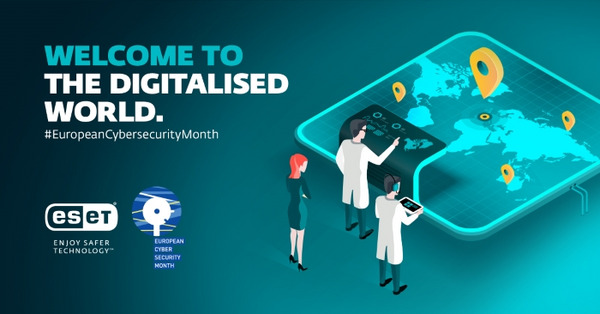While digitalisation has long been on the global agenda, it has never accelerated so quickly since WHO’s declaration of a coronavirus pandemic. By mandate, work, education, leisure and entertainment have all been driven online, along with nearly every other aspect of everyday life. In many ways, this has made some activities far more accessible, allowing those who may otherwise have been isolated to interact with friends and family members and access new services. However, citizens of this increasingly digitalised world face an imminent need to develop the personal cyber skills needed to stay safe and thrive online.
This is why digital skills is one of the central themes of this year’s European Cybersecurity Month, which takes place annually over the month of October. European Cybersecurity Month (ECSM) is coordinated by the European Union Agency for Cybersecurity and the European Commission and seeks to promote the safer use of the Internet throughout Europe. Since 2012, it has brought together key parties from different countries under the slogan ‘Cybersecurity is a Shared Responsibility’ to unite against cyber threats.
While digital skills may previously have been reserved for those seeking a career in computing, today’s increasingly connected world means that we all now need some basic cyber skills as we go about our daily lives. To reflect this, the key areas of focus for the ECSM digital skills theme are data protection, password management, online privacy and protection against social engineering. These aspects are designed to promote online safety and cyber hygiene in an age of rapid digital change. By establishing good practices online and developing the skills needed to navigate a digital world, individuals will be better able to protect themselves, their devices and their data from whatever cyber challenges they face.
Passwords are one of the most basic forms of security, yet they are often neglected, with people using easy-to-guess phrases or the same password for multiple accounts. Some of the weakest passwords are the easiest for cybercriminals to guess – such as ‘password’ or ‘12345’. It is far safer to use a combination of random words, capital letters and numbers. Importantly, you must use different passwords for each of your online accounts. To remember these, you could write them down or use a password manager, such as ESET Password Manager, but you should make sure no one else can find them. Don’t stick your password to your computer screen or behind you if you’re going to be on video calls.
Not everything we do online is secret, but it’s important to keep privacy in mind as you consider what to post and who has access to your profiles. If people share everything online, it is much easier for cybercriminals to build profiles and find patterns. Check your privacy settings so that you know who can see what you post – and restrict access if needed. Also, remember to turn off your Wi-Fi, Bluetooth and GPS if they aren’t being used, as these can leave you vulnerable to hackers or transmit information you’d rather keep private.
To find out more about how to sharpen your cyber skills, visit the ECSM learning page here. For more information about European Cybersecurity Month – and this year’s other theme: Cyber Scams – visit the campaign’s website.

About ESET
For more than 30 years, ESET® has been developing industry-leading IT security software and services for businesses and consumers worldwide. With solutions ranging from endpoint and mobile security to encryption and two-factor authentication, ESET’s high-performing, easy-to-use products give consumers and businesses the peace of mind to enjoy the full potential of their technology. ESET unobtrusively protects and monitors 24/7, updating defences in real time to keep users safe and businesses running without interruption. Evolving threats require an evolving IT security company. Backed by R&D centres worldwide, ESET is the first IT security company to earn 100 Virus Bulletin VB100 awards, identifying every single “in-the-wild” malware without interruption since 2003. For more information, visit our website or follow us on LinkedIn, Facebook and Twitter.